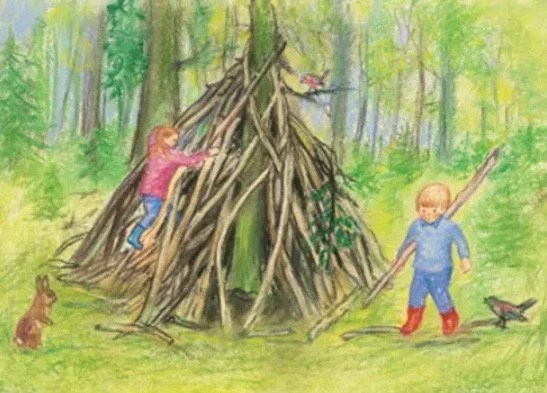Drop- off Offerings
Saplings
2 to 5 years old
Rhythm of the Week:
Tuesday: Bread Making; Wednesday: Chopping Vegetables for soup day & Seasonal craft, Thursday: Painting.
Snack of the Week:
Tuesday: Bread (with butter or almond butter) & fruits & hard boiled eggs
Wednesday: Yogurt, home-made granola and fruits.
Thursday: Seasonal soup & baked sweet potatoes fries.
Surprise: Baked Apples & Cinnamon Empanadas
Birthdays: Sweet bread (banana, apple or chocolate chip), whipped cream and fruits.
All of our vegetables, stocks, dairies and fruits are grass-fed and/or organic and the sweet bread and granola are made with honey. We serve warm tea every day.
Rhythm of the Day:
9:30: Arrival at the little playground, mousy snack (cut up apples, cucumbers or cheese) & good-morning circle verse.
10 to 10.10: washing hands and undressing.
10.10 to 10.40: activity
10.40 to 11.10: inside play
11.15 to 11.45: snack
11.45 to 12: cleaning, washing dishes
12 to 12.30: outside play and circle time.
12:30: Good-bye
1:00: After-care dismissal.
The Rhythm of the Day is approximate. We strive to be outside as much as possible. If the weather is warm or if it’s snowing, inside play will often become part of our outside play time.
Please try to arrive on time so you and your child have the time to put belongings in their respective cubbies, settle outside and be ready to say our morning verse all together before departing.
I will be sending a welcome letter mid-August with all pertinent details as well as with the directory of all the families. (if you choose to opt in)
Children do not need to be potty-trained. We don’t want them to be forced into anything that they are not ready to do and also we are in-tune with families so when they decide to start the potty training process, we accompany them following their home rhythm.
Claudia Garavito will be my partner in the classroom. Claudia worked as an assistant at Harbor Waldorf School for 3 years and is very familiar with the Waldorf ways. We speak Spanish amongst each other and will be including Spanish words, sentences and songs into the curriculum!
Saplings is a mixed-age kindergarten inspired by Waldorf Pedagogy where play is the curriculum.
Play is so important because it allows children to grow in every area of their being. It is a foundation for all their learning and allows them to explore every aspect of life, including the ones that hold sorrow and problems for them.
Play:
Helps children understand life through enacting what they experience in life.
Bring out the uniqueness of every child.
Is universal in the sense that all children from the same age play in similar ways.
Is inclusive. Forming a common realm where external differences (language, culture) are small compared with the child’s urge to play.
Is necessary for brain development. At birth the brain has the capacity to learn to walk, run, jump, etc. However, this capacity in the brain develops if the child actually does these things. The brain needs a multi-sensory enriched environment to be awakened.
An ideal environment for development is one that is not under-stimulated (too little of everything), nor over-stimulated (too much of everything). It also provides the child with a sense of comfort (adults nearby), offers meaningful activities (gardening, cleaning, cooking, washing), and includes a reasonable amount of materials that can be used in many different ways.
Research shows that play is vital to the development of children’s mathematical thinking. Mathematical knowledge, as play, cannot be learned by hearing people talking about it, but by direct experimentation.
Finally, play is important for the development of different kinds of problem-solving skills. Play = Problem Solving = Creative Thinking.
The human being’s entire potential is available in childhood and it is brought to life through freedom of movement and by having role models to imitate.
Walking, speaking, feeling and thinking; all these human faculties, come in as an innate fashion in the human being. There is nothing the adult has to teach because the child’s own will is the one that brings forth all these activities. To help promote this in the classroom, and in life, the teachers create an environment in which rhythm is the base of every day’s activities. By knowing what to expect the child feels confident and in consequence, free to play. Repetition also helps with the building of memory. Proximity, affection and attachment opportunities are the foundation for autonomy. Autonomy is closely related to secure attachment to a caregiver who provides security for the child. From this relationship come all others as a mirror. Certainty is a requirement for independence.
At Seeds&Sprouts we believe that respect for the children is the foundation of a healthy community in the classroom. We encourage authenticity, companionship, and laughter. Finally, we focus in the here and now, paying close attention in the process of everything we do, without thinking too much on the end result.
We can’t wait to start! I hope you can join us!
If you are interested in this program please send me an email.
Sliding Scale available.
Ms. Manuela.
Tuesday, Wednesday & Thursday
September - June
9.30 to 12.30
Aftercare until 1.00PM (Please bring a packed lunch)

